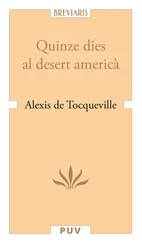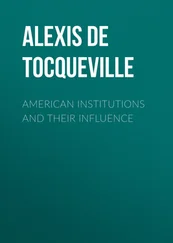Alexis de Tocqueville - Democracy in America - Volume 1
Здесь есть возможность читать онлайн «Alexis de Tocqueville - Democracy in America - Volume 1» — ознакомительный отрывок электронной книги совершенно бесплатно, а после прочтения отрывка купить полную версию. В некоторых случаях можно слушать аудио, скачать через торрент в формате fb2 и присутствует краткое содержание. Жанр: unrecognised, на английском языке. Описание произведения, (предисловие) а так же отзывы посетителей доступны на портале библиотеки ЛибКат.
- Название:Democracy in America - Volume 1
- Автор:
- Жанр:
- Год:неизвестен
- ISBN:нет данных
- Рейтинг книги:4 / 5. Голосов: 1
-
Избранное:Добавить в избранное
- Отзывы:
-
Ваша оценка:
- 80
- 1
- 2
- 3
- 4
- 5
Democracy in America - Volume 1: краткое содержание, описание и аннотация
Предлагаем к чтению аннотацию, описание, краткое содержание или предисловие (зависит от того, что написал сам автор книги «Democracy in America - Volume 1»). Если вы не нашли необходимую информацию о книге — напишите в комментариях, мы постараемся отыскать её.
libreka classics – These are classics of literary history, reissued and made available to a wide audience.
Immerse yourself in well-known and popular titles!
Democracy in America - Volume 1 — читать онлайн ознакомительный отрывок
Ниже представлен текст книги, разбитый по страницам. Система сохранения места последней прочитанной страницы, позволяет с удобством читать онлайн бесплатно книгу «Democracy in America - Volume 1», без необходимости каждый раз заново искать на чём Вы остановились. Поставьте закладку, и сможете в любой момент перейти на страницу, на которой закончили чтение.
Интервал:
Закладка:
The pride and comfort that the American people enjoy in the great commentaries of De Tocqueville are far removed from the selfish adulation that comes from a great and singular success. It is the consciousness of victory over a false theory of government which has afflicted mankind for many ages, that gives joy to the true American, as it did to De Tocqueville in his great triumph.
When De Tocqueville wrote, we had lived less than fifty years under our Constitution. In that time no great national commotion had occurred that tested its strength, or its power of resistance to internal strife, such as had converted his beloved France into fields of slaughter torn by tempests of wrath.
He had a strong conviction that no government could be ordained that could resist these internal forces, when, they are directed to its destruction by bad men, or unreasoning mobs, and many then believed, as some yet believe, that our government is unequal to such pressure, when the assault is thoroughly desperate.
Had De Tocqueville lived to examine the history of the United States from 1860 to 1870, his misgivings as to this power of self-preservation would, probably, have been cleared off. He would have seen that, at the end of the most destructive civil war that ever occurred, when animosities of the bitterest sort had banished all good feeling from the hearts of our people, the States of the American Union, still in complete organization and equipped with all their official entourage, aligned themselves in their places and took up the powers and duties of local government in perfect order and without embarrassment. This would have dispelled his apprehensions, if he had any, about the power of the United States to withstand the severest shocks of civil war. Could he have traced the further course of events until they open the portals of the twentieth century, he would have cast away his fears of our ability to restore peace, order, and prosperity, in the face of any difficulties, and would have rejoiced to find in the Constitution of the United States the remedy that is provided for the healing of the nation.
De Tocqueville examined, with the care that is worthy the importance of the subject, the nature and value of the system of "local self-government," as we style this most important feature of our plan, and (as has often happened) when this or any subject has become a matter of anxious concern, his treatment of the questions is found to have been masterly and his preconceptions almost prophetic.
We are frequently indebted to him for able expositions and true doctrines relating to subjects that have slumbered in the minds of the people until they were suddenly forced on our attention by unexpected events.
In his introductory chapter, M. De Tocqueville says: "Amongst the novel objects that attracted my attention during my stay in the United States, nothing struck me more forcibly than the general equality of conditions." He referred, doubtless, to social and political conditions among the people of the white race, who are described as "We, the people," in the opening sentence of the Constitution. The last three amendments of the Constitution have so changed this, that those who were then negro slaves are clothed with the rights of citizenship, including the right of suffrage. This was a political party movement, intended to be radical and revolutionary, but it will, ultimately, react because it has not the sanction of public opinion.
If M. De Tocqueville could now search for a law that would negative this provision in its effect upon social equality, he would fail to find it. But he would find it in the unwritten law of the natural aversion of the races. He would find it in public opinion, which is the vital force in every law in a free government. This is a subject that our Constitution failed to regulate, because it was not contemplated by its authors. It is a question that will settle itself, without serious difficulty. The equality in the suffrage, thus guaranteed to the negro race, alone—for it was not intended to include other colored races—creates a new phase of political conditions that M. De Tocqueville could not foresee. Yet, in his commendation of the local town and county governments, he applauds and sustains that elementary feature of our political organization which, in the end, will render harmless this wide departure from the original plan and purpose of American Democracy. "Local Self-Government," independent of general control, except for general purposes, is the root and origin of all free republican government, and is the antagonist of all great political combinations that threaten the rights of minorities. It is the public opinion formed in the independent expressions of towns and other small civil districts that is the real conservatism of free government. It is equally the enemy of that dangerous evil, the corruption of the ballot-box, from which it is now apprehended that one of our greatest troubles is to arise.
The voter is selected, under our laws, because he has certain physical qualifications—age and sex. His disqualifications, when any are imposed, relate to his education or property, and to the fact that he has not been convicted of crime. Of all men he should be most directly amenable to public opinion.
The test of moral character and devotion to the duties of good citizenship are ignored in the laws, because the courts can seldom deal with such questions in a uniform and satisfactory way, under rules that apply alike to all. Thus the voter, selected by law to represent himself and four other non-voting citizens, is often a person who is unfit for any public duty or trust. In a town government, having a small area of jurisdiction, where the voice of the majority of qualified voters is conclusive, the fitness of the person who is to exercise that high representative privilege can be determined by his neighbors and acquaintances, and, in the great majority of cases, it will be decided honestly and for the good of the country. In such meetings, there is always a spirit of loyalty to the State, because that is loyalty to the people, and a reverence for God that gives weight to the duties and responsibilities of citizenship.
M. De Tocqueville found in these minor local jurisdictions the theoretical conservatism which, in the aggregate, is the safest reliance of the State. So we have found them, in practice, the true protectors of the purity of the ballot, without which all free government will degenerate into absolutism.
In the future of the Republic, we must encounter many difficult and dangerous situations, but the principles established in the Constitution and the check upon hasty or inconsiderate legislation, and upon executive action, and the supreme arbitrament of the courts, will be found sufficient for the safety of personal rights, and for the safety of the government, and the prophetic outlook of M. De Tocqueville will be fully realized through the influence of Democracy in America. Each succeeding generation of Americans will find in the pure and impartial reflections of De Tocqueville a new source of pride in our institutions of government, and sound reasons for patriotic effort to preserve them and to inculcate their teachings. They have mastered the power of monarchical rule in the American Hemisphere, freeing religion from all shackles, and will spread, by a quiet but resistless influence, through the islands of the seas to other lands, where the appeals of De Tocqueville for human rights and liberties have already inspired the souls of the people.
Hon. John T. Morgan
Special Introduction By Hon. John J. Ingalls
Nearly two-thirds of a century has elapsed since the appearance of "Democracy in America," by Alexis Charles Henri Clerel de Tocqueville, a French nobleman, born at Paris, July 29, 1805.
Bred to the law, he exhibited an early predilection for philosophy and political economy, and at twenty-two was appointed judge-auditor at the tribunal of Versailles.
Читать дальшеИнтервал:
Закладка:
Похожие книги на «Democracy in America - Volume 1»
Представляем Вашему вниманию похожие книги на «Democracy in America - Volume 1» списком для выбора. Мы отобрали схожую по названию и смыслу литературу в надежде предоставить читателям больше вариантов отыскать новые, интересные, ещё непрочитанные произведения.
Обсуждение, отзывы о книге «Democracy in America - Volume 1» и просто собственные мнения читателей. Оставьте ваши комментарии, напишите, что Вы думаете о произведении, его смысле или главных героях. Укажите что конкретно понравилось, а что нет, и почему Вы так считаете.












